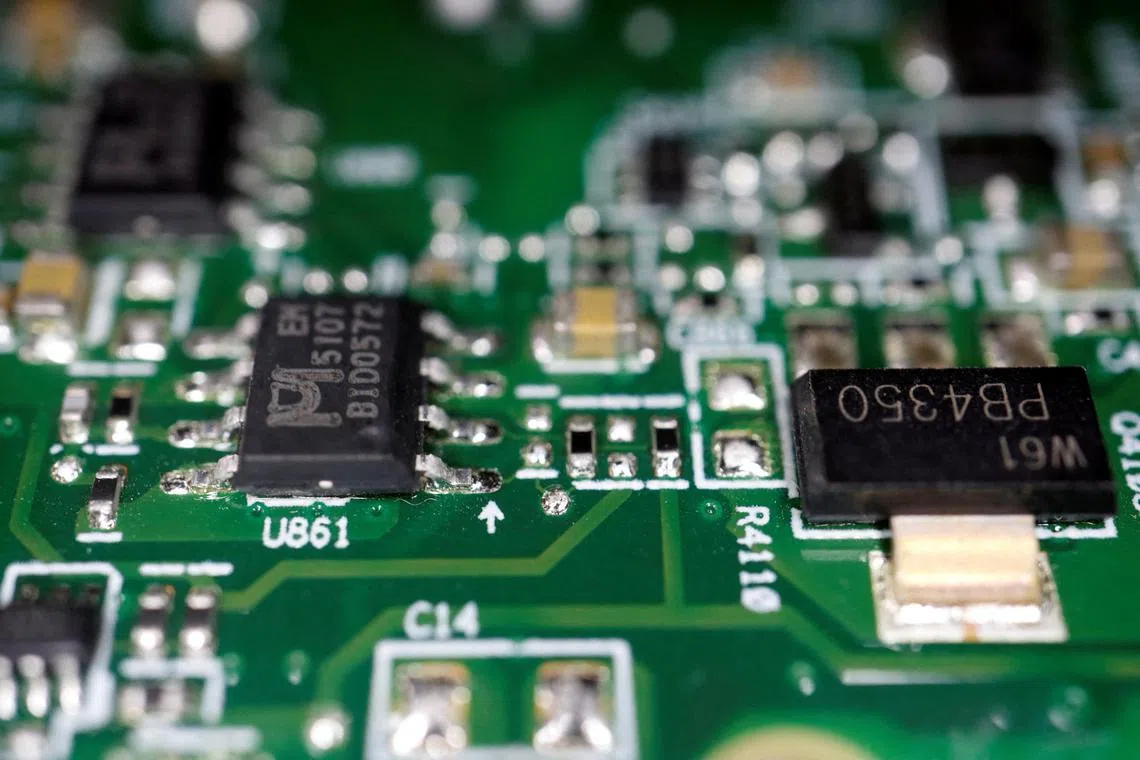S’pore backs removing curbs to chip trade, aims to do more to enable green tech, rep tells WTO panel
Sign up now: Get ST's newsletters delivered to your inbox

Chip makers in Singapore account for around 12 per cent of global chip sales, said Singapore Semiconductor Industry Association executive director Ang Wee Seng.
PHOTO: REUTERS
Follow topic:
GENEVA - Delegates to the World Trade Organisation (WTO) Public Forum in Geneva this week have called for the lowering of restrictions to trading the components that enable green technologies, particularly semiconductors, and other information and communications technology (ICT) products.
In particular, the president of US lobby group Semiconductor Industry Association, Mr John Neuffer, called for a third-round expansion of the WTO Information Technology Agreement (ITA) to eliminate tariffs on some 400 ICT parts and products.
The ICT product categories proposed for so-called ITA3 coverage include semiconductor manufacturing and next-generation chip technologies, as well as lithium-ion batteries and energy efficiency and storage devices, among other new and emerging ICT products and technologies.
This could add more than US$750 billion (S$1.02 trillion) to the global economy over 10 years, according to estimates provided by the Information Technology and Innovation Foundation (ITIF), a Washington-based public policy think-tank.
In a panel discussion on Tuesday on semiconductor trade and its role in driving sustainability, Mr Neuffer said chips are enablers of green technologies and innovations that help tackle climate change, such as energy-efficient data centres and buildings, electric vehicles, solar panels and 3D printers.
Singapore Semiconductor Industry Association executive director Ang Wee Seng, who was also on the panel, said the Republic supports the WTO and is “open to looking at a further expansion of the ITA”.
Lowering the tariffs for new technologies and ICT would bring a larger number of economies and businesses into the global tech value chain, leading to lower product costs, new opportunities for jobs and higher adoption of sustainable green technologies, Mr Neuffer said.
This comes at a time when major chipmakers and other large tech producers are reviewing their suppliers and locations for production and assembly
Just this week, chip giant GlobalFoundries opened a new US$4 billion plant in Singapore
Mr Ang noted that the agreement to remove tariffs on hundreds of ICT products was originally signed in Singapore in 1996. A total of 82 countries inked the deal, representing about 97 per cent of world trade in ICT products at the time.
In 2015, negotiations for an ITA-2 to remove tariffs on an additional 201 ICT parts, components and final products worth US$1.3 trillion in annual global trade, was concluded in Nairobi.
The ITIF estimates that ITA-2 has produced annual global tariff savings of at least US$13.8 billion.
China and the United States, which are engaged in an ongoing tech war that has crippled trading in advanced semiconductors between the two superpowers, are signatories of ITA and ITA-2.
Mr Ang said chip manufacturers in Singapore – which include industry giants Micron, GlobalFoundries, UMC, Vanguard and TSMC – currently supply around 7 per cent of the world’s semiconductors and make up around 12 per cent of global chip sales.
Speaking to The Straits Times on the sidelines of the WTO forum, he added that the market for advanced chips used in powerful green innovations like electric vehicles and solar panels is growing quickly and forecast to hit US$1 trillion in value by 2030, compared with US$620 billion now.
“That implies that we will see 30 per cent to 40 per cent growth in the sale of chips going into renewables and green solutions in the next two to three years. Demand for chips in this area is growing much faster than chips used in other industries, such as electronics.”
As such, it would be beneficial for Singapore if barriers such as tariffs and other protective measures in the semiconductor industry are removed to facilitate the trade and transfer of green ICT and technology.
Mr Ang added that there is also a need for Singapore to create more awareness about the semiconductor industry’s role in enabling sustainability.
“Manufacturing is one of the biggest industries here, and we are in the position to provide solutions to carbon emissions. This is important in driving trade and investment flows to Singapore, which is pushing for its own green plan by 2050,” Mr Ang said.

